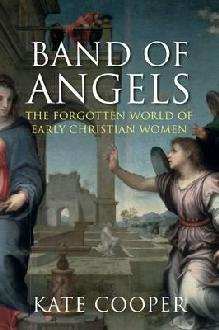Book explores early church's 'forgotten women'

A Manchester University professor has published a book to shine light on the women she claims have been neglected by mainstream churches.
Band of Angels: The Forgotten World of Early Christian Women by Professor Kate Cooper draws on five years of research and looks at some of the women who were hugely influential as Christianity spread in the first and second centuries.
She argues that women played a central role in spreading the new Christian faith through informal friendship and family networks.
Their authority within Christian communities was earned through their role as parents, community organisers, and small business owners.
Women featured in her book include Lydia, the Purple-seller in Philippi and sponsor of Paul recorded in the Book of Acts, and Perpetua, who lived in Carthage at the end of the second century and who was famous at the time for refusing to denounce her faith, choosing martyrdom against her father's wishes.
A lesser known woman of faith is Thecla of Iconium, who was believed by second century Christians to have been one of St Paul's disciples and refused to marry – a radical decision for the time.
"Though there is no certain evidence that Thecla existed, her story was hugely influential in the first few hundred years of early Christianity," said Professor Cooper.
"The influence of her story was far-reaching, in that it became the root of the Catholic theology of chastity and virginity.
"Every major Christian male writer in the fourth century had a sister, and these young women were encouraged to follow Thecla's example. Rather than criticising her for disobeying her mother, the early Church celebrated her courage."
Professor Cooper notes that women regularly preached the Gospel in the first two centuries of Christianity and even carried out baptisms in some communities.
It was following Roman Emperor Constantine's conversion to Christianity in around 313AD that the Christian faith became institutionalised with male bishops, while women took a more background role.
"Christianity was quite revolutionary in the way it treated its women, especially when you realise how sexist the ancient world was," says Professor Cooper.
"So it's sad that Thecla and her contemporaries are not properly remembered and honoured today. They should be an inspiration: for example to the people campaigning for women bishops and priests."
Professor Cooper added: "These women – saints who had a radical and powerful presence in the early church – have been hidden in plain sight.
"Many Gospel stories, for example – such as the story of Mary and Martha in the Gospel of Luke – can tell us far more about women's role if we stop to pay close attention – something male writers have not done.
"The ancient sources mention the women, but over time less and less attention was given to their role. Really, they have been airbrushed out of history.
"It is quite sad that a religion which began with a mother and her wonderful baby should still have so much difficulty with remembering to honour the contribution of its women."











